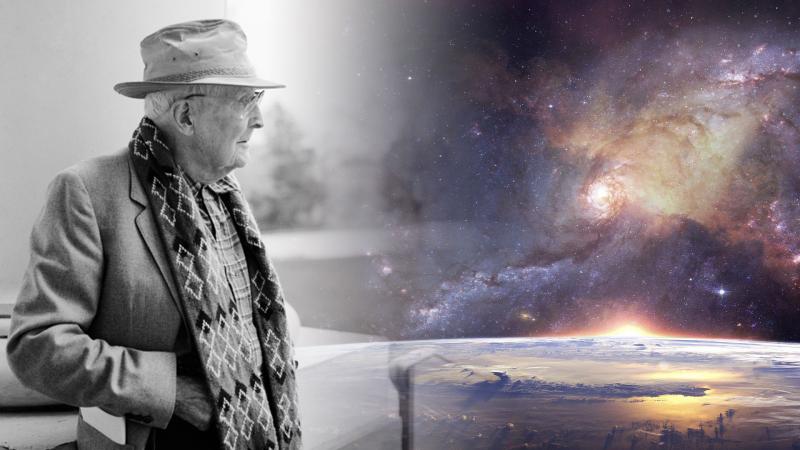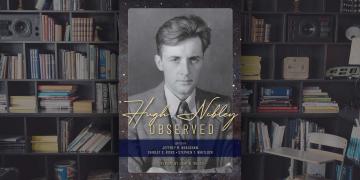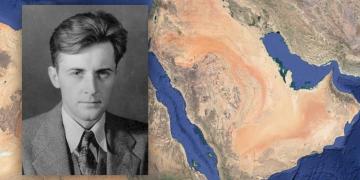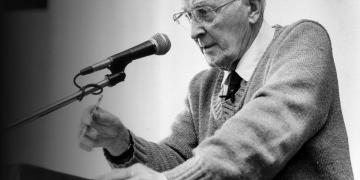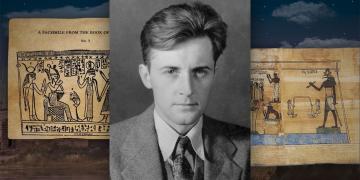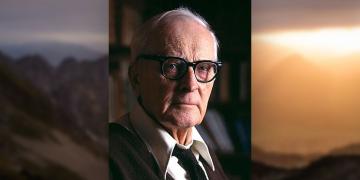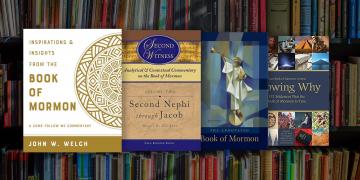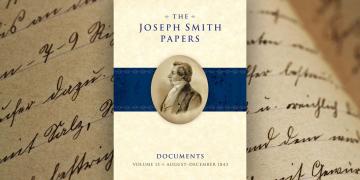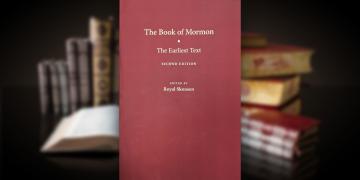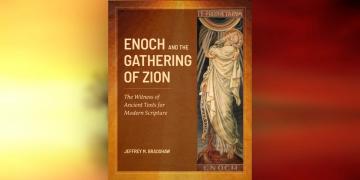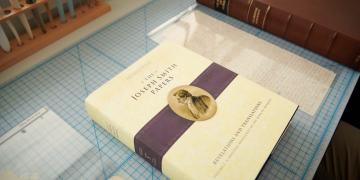You are here
Book of Mormon Central is in the process of migrating to our new Scripture Central website.
We ask for your patience during this transition. Over the coming weeks, all pages of bookofmormoncentral.org will be redirected to their corresponding page on scripturecentral.org, resulting in minimal disruption.
Buy Hugh Nibley Observed
This is the sixth of eight weekly blog posts published in honor of the life and work of Hugh Nibley (1910–2005). The series is in honor of the new, landmark book, Hugh Nibley Observed, available in softcover, hardback, digital, and audio editions. Each week our post is accompanied by interviews and insights in pdf, audio, and video formats. (See the links at the end of this post.)
Besides those who actively oppose the idea that that a loving, personal God exists in heaven, there have also always been others to whom questions of this sort never even occur. Elder Neal A. Maxwell, quoting Walter Bagehot, described such “disbelievers[, who] do not necessarily deny the great truths but are simply too preoccupied with other concerns”:1
They do not deny them, but they live apart from them; they do not disbelieve them, but they are silent when they are stated. They do not question the existence of Kamchatka,2 but they have no call to busy themselves with Kamchatka; they abstain from peculiar tenets. … [Such] persons … do not, as it would seem cannot, feel all that others feel; [they] have, so to say, no ear for much of religion, [and] are [thus] in some sort out of its reach.3
Is there a remedy?
If you could extend before men the awful vision of everlasting perdition; if they could see it as they see the things of earth, — as they see Fleet Street and St. Paul's; if you could show men likewise the inciting vision of an everlasting heaven … with undeniable certainty and invincible distinctness, — who could say that they would have a thought for any other motive?4
In a letter to his friend Paul Springer, quoted in Boyd Petersen’s marvelous biography, Hugh Nibley said the same thing more succinctly:5
One peep at the other side and this [earthly] show looks too cheap for anything.
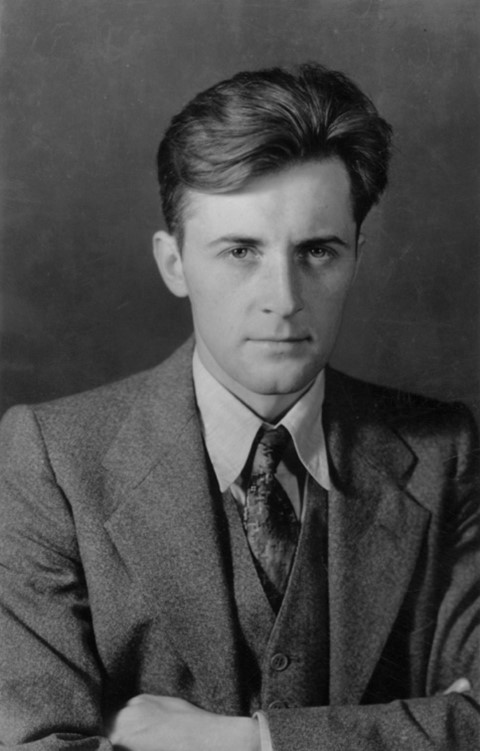
Hugh in 1933. “I was terribly bothered by about this afterlife business.”
Nibley could speak on this subject with the kind of authority that comes from firsthand experience:6
[I always had a testimony of the gospel] except for one short period — when the bottom of the world fell out. That was desperate. … I was terribly bothered about this afterlife business and that sort of thing. I had no evidence for that whatever. And I remember I went up to Mt. Wilson7 at that time. I walked around in the snow and brooded about it and I came back.
We had a meeting at the old Hollywood Ward. Matthew Cowley's father[, Matthias F. Cowley,] was the speaker that night. So, I went up to meet Brother Cowley, and as soon as he took my hand, he says, “Come with me, I want to give you a blessing.” The blessing was that the Lord would give me an answer immediately to the thing that had been puzzling my mind. Within the week I had an appendicitis attack and so we went to the old Seventh Day Adventist Hospital out in Loma Linda and had the appendix taken out.
According to Phyllis, Hugh swallowed his tongue during the operation and actually was at one time technically dead” until they brought him back with a resuscitator. “But during that period, he had one of these ‘life after death’ experiences very much like the ones that Dr. Moody describes.”8 Hugh related the experience as follows:9
Then all of a sudden down this thing like a tube, you know, you get sucked down this thing and you come out. [I thought,] Oh, boy, I know everything, and everything is there, and this is what I wanted to know! Three cheers, and all this sort of thing. … All I wanted was to know whether there was anything on the other side, and when I came out there, I didn't meet anything or anybody else, but I looked around. and not only was in all possession of my faculties, but they were tremendous. I was light as a feather and ready to go, you see. Above all I was interested in problems. I'd missed out a lot of math and stuff like that. Now in five minutes I would be able make up for that. Remember, as Joseph Smith said, “If you could look for five minutes into yonder heavens,” you see, you can forget about all the rest you ever bothered about.10
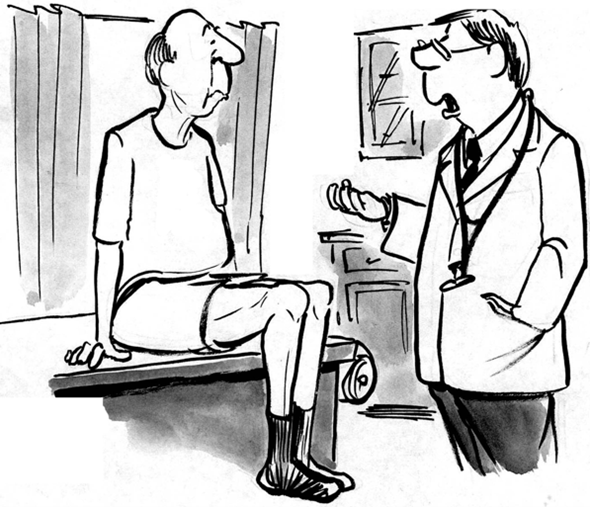
A successful businessman learns he has about three weeks to live.11
Trying to help those who have little ear for spiritual things relate to the profound impact of such an experience on his own life, Nibley provided the following parable:12
Imagine… a successful businessman who, responding to some slight but persistent physical discomfort… pays a visit to [the] doctor. Since the man has always considered himself a fairly healthy specimen, it is with an unquiet mind that he descends the steps of the clinic … [knowing] that he has about three weeks to live. In the days that follow, this man’s thinking undergoes a … quick and brutal reorientation. …
Things that once filled him with awe seem strangely trivial, and things which a few days before did not even exist for him now fill his consciousness. For the first time he discovers the … beauty of the world of nature. …
The perfection of children comes to him like a sudden revelation, and he is appalled by the monstrous perversion that would … destroy their sensibilities. … Everywhere he looks he gets the feeling that all is passing away — … he sees all life and stuff about him involved in a huge ceaseless combustion, a literal and apparent process of oxidation which is turning some things slowly, some rapidly, but all things surely to ashes ….
‘What has happened to our solid citizen?’ his friends ask perplexed. He has chosen to keep his disease a secret, … [but] he cannot conceal his change of heart. As far as his old associates can see, the poor man has left the world of reality. …
Now the question arises, has this man been jerked out of reality or into it? Has he cut himself off from the real world or has cruel necessity forced him to look in the face what he was running away from before? Is he in a dream now or has he just awakened from one? Has he become an irresponsible child, or has he suddenly grown up? … Some will answer one way, some another. But if you want to arouse him to wrathful sermons, just try telling the man that it makes no difference which of these worlds one lives in.
Ann M. Madsen describes another important result of Nibley’s near-death experience, namely his preoccupation with “progressive repentance, forevermore, and a progressive revelation of our own ignorance.”13 Said Nibley: 14
[Absolute knowledge of the afterlife] gives me a great relief, so that's why I don't take this very seriously down here. We're just sort of dabbling around, playing around, being tested for our moral qualities, and above all the two things we can be good at, and no two other things can we do: We can forgive, and we can repent. It’s the gospel of repentance. We're told that the angels envy men their ability both to forgive and to repent because they can't do either, you see. But nobody’s very clever, nobody’s very brave, nobody’s very strong, nobody’s very wise. We’re all pretty stupid, you see. Nobody's very anything. We're not tested on those things, but in the things the angels envy us for — we can forgive, and we can repent. So, three cheers, let’s start repenting as of now.
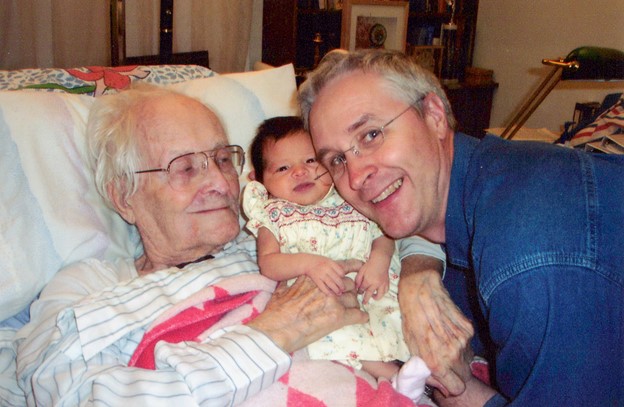
Son Alex and granddaughter Isabella with Hugh, 2003.
Hugh Nibley’s preoccupation with continual repentance stayed with him to the end of his life. Particularly difficult for him, because of his strict Victorian upbringing, was his difficulty in freely expressing his love to family and friends. In Hugh Nibley Observed, Louis Midgley relates the following experience:15
Phyllis called me and urged me to visit her husband. I did. And we talked. Hugh was in a hospital bed. He could hardly speak. …
Soon, two Relief Society sisters knocked on the door. They had brought him dinner. They rushed over and hugged him and kissed him. And he just wept. When they left, Phyllis asked me, “Did you notice that?”
I said, “Yes, I did.”
“Have you ever seen my husband show emotion?”
I answered, “No, never.”
Phyllis said that “he couldn’t” show emotion. But when he was reduced to lying there, hardly able to talk, he would say to her, “Phyllis, I have been kept after school by the Lord so I could learn a lesson that I needed to learn before I pass away.”
Hugh’s daughter Christina relates how he increasingly resembled the repentant businessman who learned he only had a short time to live:16
In the final two years of his life, as he became physically incapacitated and forced to remain in bed, my dad became the very definition of sweetness. He never voiced a complaint about his pain and confinement. And during his most lucid moments, he seemed in constant awe of the sheer wonderfulness of all the people around him. He’d always been amazed at the beauty of nature and the fascination of learning. But now for two years, he couldn’t go outside, and he couldn’t accumulate footnotes. His compulsively active attention was forced to refocus, and it did so. His awe was greater than I’d ever seen it. Particularly toward Mom, his caretaker and wife, whom he told countless times during those months, “You are just so beautiful.”
Son Alex said the following at Nibley’s funeral service especially to those who knew his father only as a great intellectual:17
His ego — that vanity he fought so long — finally died when frailty left him completely dependent on others for every function of life.
And what was left? Pure love.
I saw him on my birthday in January. Again, there was a struggle for words, and finally he said, “To lack affection is to lack everything.” How’s that for a quote from your great intellectual?
Dad resented sentimentality not because it contained too much emotion, but because it fell short of the depth of passion that he felt.
So today I celebrate the life of the most passionate man I’ve ever known.
Hugh’s passion and his faith were grounded in his absolute knowledge of the reality of the life to come. Throughout his life, he continued to have “a private arrangement with the other side which he thoroughly enjoyed.”18 At the funeral service of his young grandson-in-law Joel Erik Myres, he asked:19
Is this all there is? Here I am free to speak. … My reasoning is not perfect, but I can support it with a number of personal experiences that leave me in absolutely no doubt at all that Joel is engaged in a higher work. I expect to have this assertion confirmed in my own case before very long.
And, just as Nibley anticipated, his assertion about the continuing and increased productivity of his own afterlife has now been wholly confirmed.
***
We hope you will enjoy the video interview of Kirk Magleby embedded here, which you can view in either long or short form. Kirk, involved for many years with FARMS and a principal actor in Book of Mormon Central since its inception recounts how Hugh Nibley was a model to him and his friends from his formative years to the present day.
In addition, a short video entitled ““How Did Hugh Nibley Become a Spiritual Mentor to an Atheist Basketball Star from Croatia?” is embedded below, along with a more complete podcast and pdf transcript that are available for listening or download. The video tells the inspiring and entertaining story of how a famous basketball player, diplomat, and national hero from the former Yugoslavia became a Latter-day Saint, with the help of Hugh Nibley and his daughter Christina.
References
Bagehot, Walter. The Works of Walter Bagehot (with Memoirs by R. H. Hutton). 5 vols, ed. Forrest Morgan. Hartford, CT: The Travelers Insurance Company, 1889.
Bradshaw, Jeffrey M., Shirley S. Ricks, and Stephen T. Whitlock, eds. Hugh Nibley Observed. Orem and Salt Lake City, UT: The Interpreter Foundation and Eborn Books, 2021.
Maxwell, Neal A. We Will Prove Them Herewith. Salt Lake City, UT: Deseret Book, 1982.
Moody, Raymond A. Life After Life. Covington, GA: Mockingbird Books, 1975.
Nibley, Hugh. 1985. "The faith of an observer: Conversations with Hugh Nibley." In Eloquent Witness: Nibley on Himself, Others, and the Temple, edited by Stephen D. Ricks. The Collected Works of Hugh Nibley 17, 148–76. Salt Lake City, UT: Deseret Book, 2008. http://www.bhporter.com/Hugh%20Nibley/The%20Faith%20of%20an%20Observer%20Conversations%20with%20hugh%20Nibley.pdf.
———. 2001. "Graveside service address for Joel Erik Myres." In Eloquent Witness: Nibley on Himself, Others, and the Temple, edited by Stephen D. Ricks. The Collected Works of Hugh Nibley 17, 263–68. Salt Lake City, UT: Deseret Book, 2008.
Nibley, Hugh W. 1955. "The way of the Church." In Mormonism and Early Christianity, edited by Todd M. Compton and Stephen D. Ricks. The Collected Works of Hugh Nibley 4, 209-322. Salt Lake City, UT: Deseret Book, 1987.
Petersen, Boyd Jay. Hugh Nibley: A Consecrated Life. Draper, UT: Greg Kofford Books, 2002.
Smith, Joseph, Jr., Andrew F. Ehat, and Lyndon W. Cook. The Words of Joseph Smith: The Contemporary Accounts of the Nauvoo Discourses of the Prophet Joseph, 1980. https://rsc.byu.edu/book/words-joseph-smith. (accessed August 21, 2020).
Smith, Joseph, Jr., Andrew H. Hedges, Alex D. Smith, and Brent M. Rogers. Journals: May 1843-June 1844. The Joseph Smith Papers, Journals 3, ed. Ronald K. Esplin and Matthew J. Grow. Salt Lake City, UT: The Church Historian's Press, 2015.
Smith, Joseph, Jr. 1938. Teachings of the Prophet Joseph Smith. Salt Lake City, UT: Deseret Book, 1969.
- 1. N. A. Maxwell, Prove, pp. 88–89.
- 2. A remote peninsula in the far east of Russia. https://en.wikipedia.org/wiki/Kamchatka_Peninsula (accessed May 3, 2021).
- 3. W. Bagehot, Bagehot, 1:42, https://archive.org/details/cu31924024730941/ (accessed May 3, 2021).
- 4. Ibid., 2:302, https://archive.org/details/worksofwalterbag02bageiala/ (accessed May 3, 2021).
- 5. Letter to Paul Springer, 2 February 1964, quoted in B. J. Petersen, Nibley, p. 131.
- 6. H. Nibley, Faith of an Observer, p. 161. See Dan Peterson’s account of this event in J. M. Bradshaw et al., Hugh Nibley Observed, pp. 164–166.
- 7. Mount Wilson is above Pasadena, California. Hugh was living in Glendale, California at the time.
- 8. Phyllis Nibley in H. Nibley, Faith of an Observer, p. 161. According to son Tom, Phyllis “had a similar experience during a difficult pregnancy” (J. M. Bradshaw et al., Hugh Nibley Observed, p. 563). On “Life after Life” experiences generally, see R. A. Moody, Life After Life. Tom recalls that “examining and explaining what this sort of thing was about and telling us about his own experience” became the subject of two family home evenings (J. M. Bradshaw et al., Hugh Nibley Observed, p. 564).
- 9. H. Nibley, Faith of an Observer, pp. 161–162.
- 10. Cf. Joseph Smith: “Could you gaze into heaven five minutes, you would know more than you would by reading all that was ever written on the subject” (J. Smith, Jr., Teachings, 9 October 1843, p. 324. Cf. J. Smith, Jr. et al., Journals, 1843-1844, p. 109; J. Smith, Jr. et al., Words, p. 254). In the report in the Times and Seasons (4, 15 September 1843, pp. 331–332) the Prophet also writes: “Knowledge of [our condition and true relation to God] can only be obtained by experience in these things, through the ordinances of God set forth for that purpose … and in answer to prayer” (ibid., p. 253. Regarding the requisite ordinances, see ibid., pp. 53–54 n. 19).
- 11. https://www.rd.com/list/medical-cartoons/ (accessed May 3, 2021).
- 12. H. W. Nibley, Way, pp. 302–305.
- 13. Ann M. Madsen, in J. M. Bradshaw et al., Hugh Nibley Observed, p. 201.
- 14. H. Nibley, Faith of an Observer, p. 162.
- 15. Louis Midgley in J. M. Bradshaw et al., Hugh Nibley Observed, pp. 625–626.
- 16. Christina Nibley Mincek in ibid., p. 573.
- 17. Alex Nibley in ibid., p. 559.
- 18. Recollection of Tom Nibley of a statement of his father made on multiple occasions, ibid., p. 568.
- 19. H. Nibley, Graveside Service, p. 268.
Subscribe
Get the latest updates on Book of Mormon topics and research for free


